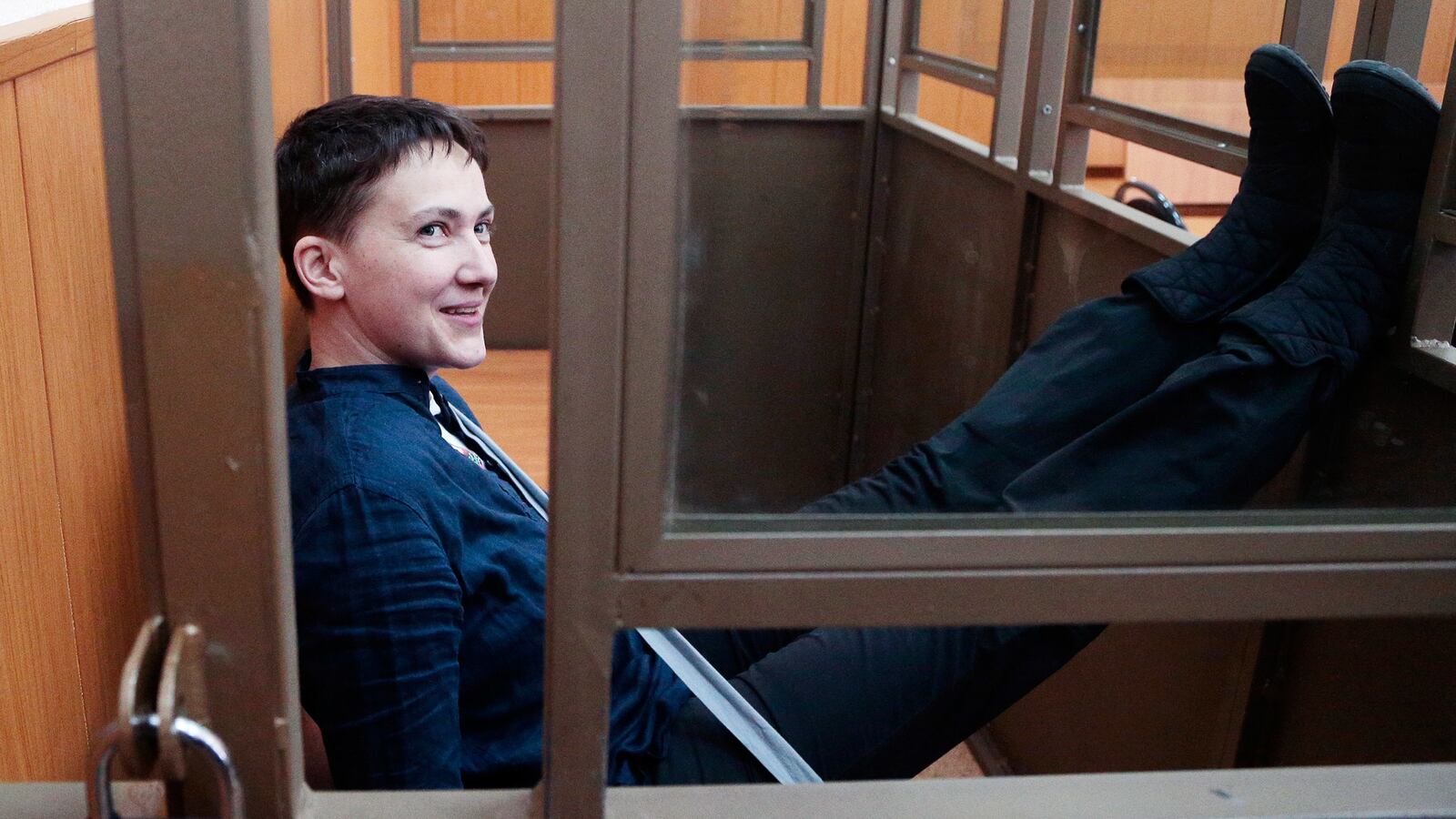When the guilty verdict came down Tuesday, the prisoner of war burst into song.
Nadezhda Savchenko looked defiant in her glass cage as she listened to her sentence. Her muscular arms were crossed over her chest and she wore a white T-shirt emblazoned with the national emblem of Ukraine. When the judge announced her punishment—22 years in prison for directing a mortar attack that killed two Russian journalists in 2014—Savchenko smiled sardonically and began singing a traditional Ukrainian song, and chanting, “Glory to Ukraine!”
The 34-year-old politician and pilot—the first woman to graduate from Ukraine’s air force academy—had long denounced her trial as a “farce.”
Russian prosecutors asked the court to punish Savchenko for the mortar attack, which she supposedly orchestrated as a member of the pro-Kiev Aidar battalion fighting in the Donbas region. They slammed her as “aggressive and impulsive” and claimed she hated the citizens of the breakaway republic. Savchenko was captured by rebels in 2014 and turned over to Russian authorities, while prosecutors claim that she escaped from rebels and crossed the border on her own, illegally.
Only a few reporters, family members, and foreign observers were allowed into the courtroom. Most journalists did not get in, and watched the process in a special room on video.
At any court process, the main words are the most important: first the judge says guilty or not, and then reads the verdict, sometimes for two to three days. On Monday, there was some confusion over the initial statements of the judge, Leonid Stepanenko, who stated that “Nadia Viktorivna Savchenko committed the killing of [soldiers] Kornelyuk and Voloshin by a group of persons by previous concert for hatred and enmity motives.” The judge also concluded that the pilot had illegally crossed the border into Russian territory. “The motive for the crimes committed by the accused was hatred and hostility towards the inhabitants of the Lugansk region, and towards Russian-speaking people as a whole.”
It was a confusing moment for all news agencies—was the judge pronouncing the pilot guilty, or quoting prosecutors? The main word “guilty” was still not pronounced on Monday. One of Russia’s most respected newspapers, Novaya Gazeta, even held a special briefing on whether to break the news of a guilty verdict and decided against it. “We were torn, as it is a standard procedure—the judges always mention the decision in the very beginning of the verdict and it did sound like the judge recognized her guilty,” the newspaper’s court reporter, Vera Chelisheva, told The Daily Beast. Russian state media, including Interfax and Russia Today, went ahead and published the news: the court had “convicted” the Ukrainian pilot.
On Tuesday, that news became official. In the courtroom, Savchenko seemed to be indifferent to the judge’s final word. “Well, I do not care what sort of verdict it is. In 10 days, when the verdict takes effect, I will declare a dry hunger strike and keep it to the end,” she told reporters before the judge entered the courtroom. “I do not believe anybody in Russia any longer,” she added.
It was a long court process that started last September, “the case of the year,” as some Russian reports referred to it, though it did not take place in Moscow but in a small town in Donetsk. During the last six months, Savchenko had declared multiple hunger strikes, living days without drinking water and practically melting away. To her countrymen, Savchenko’s exhausted, bony face next to national emblems on the shirts she wore symbolized Ukraine’s suffering from the conflict with Russia.
On Monday she looked fit and unbroken. Almost two years ago, Savchenko was fighting in the Aidar battalion in eastern Ukraine against Russia-backed rebels. Her defense insists that she was captured by rebels and taken to Russia, while prosecutors claim that she escaped from rebels and crossed the border on her own, illegally.
Outside the courtroom, a group of activists demonstrated in support of her guilty verdict. “Savchenko was involved in the murdering of Russian journalists!” one of the banners said. By 4:23 p.m. the judge allowed five young men into the courtroom; they unfolded printed photographs of the Russian journalists murdered in Ukraine, allegedly Savchenko’s victims— Vesti correspondent Igor Kornelyuk and a video engineer, Anton Voloshin.
Not all reporters were allowed into the courtroom. Among the lucky ones was a British blogger, Graham Philips, known for his strong pro-Kremlin agenda. Several Russian cameramen were left behind the door, and some waited for hours for a permit to take pictures of Savchenko. “This is not a court, it is a madhouse,” one of the reporters, Vasily Maximov, wrote on Twitter. “I have never seen such a bad attitude towards the press.”
On Monday afternoon, the judge decided to take a break and continue reading the verdict later. “Theoretically, tomorrow the judge could introduce some extenuating circumstances we don't know yet the rest of the evidence she will cite and the sentence,” the deputy director of the Europe and Central Asia Division of Human Rights Watch, Rachel Denber, told The Daily Beast on Monday. “It’s very hard to say what will happen politically, after the verdict, with Savchenko.”
Savchenko’s supporters hope that, even with the conviction, Savchenko could be transferred to her home country as a prisoner of war. Both leaders of the European Union and U.S. President Barack Obama have called for the Kremlin to free Savchenko; but it is well known that President Vladimir Putin does not like to be pressured. Russian officials dismissed all calls from the West as attempts to interfere with Russia’s internal affairs.
From the courtroom, Savchenko’s defense lawyer hinted that only Washington could help his client’s fate at this point and persuade Moscow to pass the pilot to her home country of Ukraine. On Monday the lawyer wrote in his Twitter: “John Kerry is coming to Moscow on Wednesday. Welcome. You know what I mean...”






